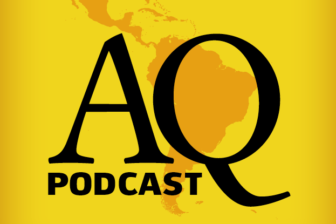MEXICO CITY – With President Andrés Manuel López Obrador’s administration pursuing a gradual response to the coronavirus crisis – announcing on April 21 that Mexico had entered the most acute phase of the outbreak – state governors calling for more urgent action have emerged as key points of opposition to the president’s policies.
The outspoken governors hail from diverse political parties, a reminder that the landscape of Mexican politics, much like its economy, could look decidedly different once the dust from COVID-19 finally starts to settle.
“Politicians are finding in the coronavirus pandemic the opportunity to get noticed, both nationally and at a local level,” Genaro Lozano, a Mexican political analyst and host of the TV debate show Punto y Contrapunto, told AQ.
The latest signs of rupture came on April 20, when Silvano Aureoles and Enrique Alfaro – governors of Michoacán and Jalisco, respectively – joined the governor of Sonora in implementing the country’s only mandatory statewide stay-at-home orders to that point.
Both governors have been sharply critical of the president, calling on the administration to provide more support for their states and indicating that they will not follow a federal timeline for reopening parts of the country. Aureoles recently accused public health officials of covering up shortages in medical equipment.
The mandatory closures were a rebuke of what critics see as López Obrador’s overly relaxed response to the crisis.
Early on, the president downplayed the risks of the outbreak and continued to tour the country to meet with supporters well after his own health officials started advising people to stay home. López Obrador’s tone has grown more stern as the crisis has worsened, though several state governors say his efforts both in trying to contain the virus and in offering economic support for those affected remain inadequate.
Mexico is not alone in seeing subnational governments stirred to action – and confrontation – as a result of the pandemic.
In Chile, mayors’ offices pressured President Sebastián Piñera’s as he initially hesitated to institute stay-at-home orders. In Brazil, where President Jair Bolsonaro remains one of the only world leaders still discounting the dangers of the virus, state governors have banded together to implement isolation measures and draft economic plans to soften the blow for informal workers. São Paulo Governor João Doria recently told Time that governors across the political spectrum have “never been so united.”
But the upheaval in Mexico has also sharpened longstanding debate about the nature of Mexican federalism, in which states’ economic fortunes are heavily dependent on the good will of the administration in charge.
“It’s unfortunate that the federal government has shrunk from its economic response to the coronavirus, but it’s positive that governors are reacting,” Mariana Campos, coordinator of public spending and accountability research at México Evalúa, a think tank, told AQ. “This could help reinforce the states’ role in Mexico’s federal system.”
Some governors, disappointed that the administration’s economic recovery plan did not include significant tax relief for individuals or businesses, have implemented measures of their own despite a lack of fiscal flexibility and prohibitions on taking on foreign debt.
In Chihuahua, Governor Javier Corral has offered steep discounts on payroll taxes for small businesses. Alfaro’s administration in Jalisco is offering an extension for residents to pay property taxes, along with some other measures. Governors elsewhere have followed suit.
Even Mexico City Mayor Claudia Sheinbaum – an unflinching ally of López Obrador who formed part of his protest Cabinet after his presidential election defeat in 2006 – has taken some small steps beyond the federal government, including through an unemployment insurance program.
The city has also deployed mobility experts to track how social distancing guidelines are working, and implemented an SMS system to help residents self-diagnose and decide what to do if they think they have the virus. After initially seeming to discount the immediate risks of the outbreak, Sheinbaum’s technocratic approach in the weeks since has contrasted with López Obrador’s by-the-gut style.
“The city was slow in reacting to the crisis, but it has begun to find its own voice, and Sheinbaum has become more and more relevant as the pandemic has progressed,” Lozano said.
The governors, though, are limited by a lack of resources and independence. Despite being legally empowered to collect 18 types of tax, Mexican states only collect an average of six, according to a recent study by IMCO, a think tank. States take in an average of just 12% of their income from direct tax collection. (Mexico City, which is administered essentially as a state but takes in over 40% of revenue from taxes thanks to its high concentration of businesses, is one big exception.)
In the wake of the government’s response to the outbreak, multiple opposition governors have thus revived threats to leave Mexico’s so-called fiscal pact – the arrangement by which states allow the federal government to collect the vast majority of tax revenue in exchange for pre-determined disbursements of spending money, amounting to around 80% of states’ income. Many other governors agree that the arrangement should be revisited once the crisis is over.
“We need to decide as a country if we want to have states with more independence, but also more responsibility,” Campos said.
There is, of course, debate over whether opposition to the president’s policies is grounded purely in public health or even economic concerns. In Baja California, Governor Jaime Bonilla, a member of López Obrador’s party, has drawn sharp criticism for questioning the federal government’s health data (provided at daily news conferences by a widely respected public health official). He continues to suggest that strict measures to contain the virus “may be worse than the disease itself.”
“The fact that governors are becoming centerpieces in this pandemic, and forcing the government to talk about taxes (and other issues), is a good thing. But there has also been some irresponsibility,” said Lozano.









